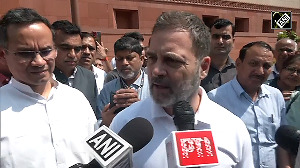As Mumbai lifts itself back on to its feet, the most immediate question facing India's citizens and government is who exactly were the attackers and how did they manage to gain such ready access to the city and to hold it to ransom for almost three days?
If the answer is indeed as initial reports suggest - militant Islamists with links to the Pakistan-based Lashkar-e-Taiba - then some difficult questions lie ahead about India's national security in the light of the shifting forms of terror in the region.
Terrorism in India over the past half century has not crystallised around one central motivating ideology - it has by no means been uniquely Islamist. Nor have its wellsprings been purely Hindu-Muslim religious rivalry. The country's many and various political and economic divisions have incited terror too. Importantly, past terrorist attacks have been largely driven by local and regional frustrations.
But in recent years India's political landscape has changed and with it the nature of terrorism. The dominance of the Congress party has declined: one main challenger to it has sought to establish a Hindu majority, with only limited electoral success.
One of its desperate strategies to muster support, however, has been to direct violence against minorities - the worst case being the anti-Muslim violence in Gujarat in 2002. That violence in particular has radicalised some Indian Muslims.
Where Muslim politics in India has tended to be heavily local, now a sense of national Muslim grievance has emerged. So, for the first time, an issue such as Kashmir, which in the past had virtually no resonance with Indian Muslims living in other parts of the country, has become a prism to focus local grievances, at least in the eyes of a small minority of Indian Muslims. Such men may have provided the local knowledge needed by the attackers.
Still more important than the emergence of a disaffected national Muslim imagination has been its novel linkage to international Islamist militancy. India's own internal politics has been pulled into a global vortex and has become directly subject to international rhythms and impulses.
Add two further facts: India has the world's largest Muslim minority (most of them young and with few avenues of effective socialisation and mobility); and India's immediate neighbour to the west is a country whose most effective current export is violent terror. This is a lethal coincidence of supply and demand.
As India works to maintain its internal security, it is now increasingly vulnerable to the forces emanating from the destabilised states populating the part of the world some call Jihadistan: Pakistan, Afghanistan, Iraq. This turbulence is in part a result of the US's long-term policies and its actions since September 11 2001.
During the cold war, the US sought to displace and contain conflicts in theatres far removed from US territory. After September 11 2001, it has embraced a different sort of containment: hoping to keep the effects of terrorism in other parts of the world.
India has so far avoided taking a lead in developing strong policies in relation to the countries to its immediate west - it has chosen, for example, to leave handling Pakistan to the US. Given the imperatives of US policy, this has been understandable but India can no longer afford to maintain such a position.
India will need to make clear to the incoming US administration that it has a direct stake in what happens in Pakistan and that it expects an effective voice in shaping policy towards it, since its own national and economic security has been time and again breached by groups housed in Pakistan, most recently last week in Mumbai.
In its own interest, India must continue to address the problem of Kashmir. The elections under way there, which have seen very high turnouts despite calls for a boycott by extremists, are one bit of encouraging news.
Above all, India must address more frankly the implications of Pakistan's implosion - its rapidly deteriorating capacity to act like a sovereign state. Vast areas of Pakistan's territory are outside state control; its structures of authority are divided between a fragile civilian government, an entrenched military, and the insidious ISI military intelligence agency and its pack of murderous affiliates.
After past international criticism, Pakistan has feigned action to rein in some of these non-state actors. General Pervez Musharraf saw off US pressure to act against Lashkar-e-Taiba by simply allowing it a name change. Its leader, Hafiz Muhammad Sayeed, continues to receive government patronage.
It has now developed a maritime attack capacity. Meanwhile, Pakistan has long refused to hand over the underworld boss, Dawood Ibrahim, wanted by Indian authorities for his role in the 1993 Mumbai bombings and a man whom some see as having a hand in last week's attacks.
If the idea of India as a plural, inclusive and open democracy - as perhaps the greatest experiment in extending political freedoms across a society whose members were long denied such liberties - is to survive and flourish, there are a host of internal problems that India must address, not least, the status and aspirations of its own Muslim citizens.
But India will also need to defend itself and its principles from those who threaten it. It needs to make clear to the one country most closely involved with Pakistan - the US - that there are things that Pakistan must do; or which India may otherwise have, with prudence, to do for itself.
The writer is author of The Idea of India, and director, south Asia studies, at Johns Hopkins School of Advanced International Studies in Washington
Copyright The Financial Times Limited 2008








 © 2025
© 2025